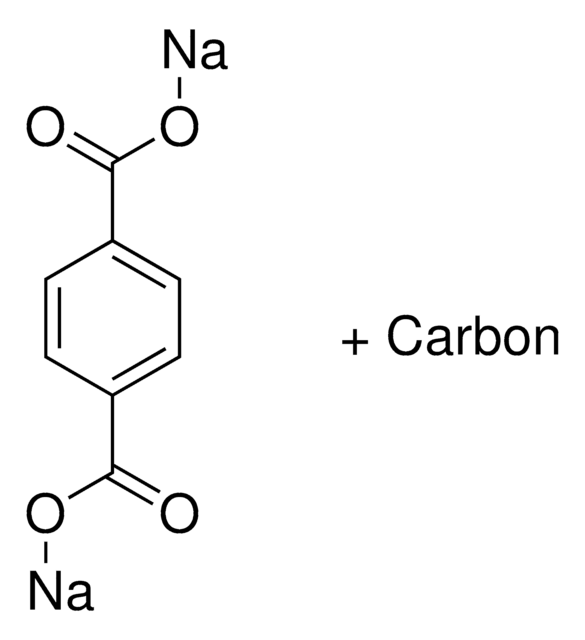おすすめの製品
品質水準
アッセイ
≥98% (acidimetric)
形状
crystalline
自己発火温度
496 °C
有効性
>6400 mg/kg LD50, oral (Rat)
mp
402 °C (sublimed)
溶解性
15 mg/L (experimental)
密度
1.51 g/cm3 at 20 °C
保管温度
2-30°C
InChI
1S/C8H6O4/c9-7(10)5-1-2-6(4-3-5)8(11)12/h1-4H,(H,9,10)(H,11,12)
InChI Key
KKEYFWRCBNTPAC-UHFFFAOYSA-N
アプリケーション
- Biotransformation of p-xylene into terephthalic acid by engineered Escherichia coli: This study explores an alternative production method for terephthalic acid (TPA) that could be less energy-intensive and safer than traditional methods. It reports the successful bioconversion of p-xylene into TPA using genetically engineered E. coli, highlighting a potential sustainable approach to TPA production (Luo & Lee, 2017).
- Synthesis and verification of biobased terephthalic acid from furfural: This research presents a novel synthetic pathway for producing TPA from biomass-derived furfural. It represents a significant step towards sustainable chemical production, providing a greener alternative to petrochemical routes (Tachibana, Kimura & Kasuya, 2015).
- Studies on the solubility of terephthalic acid in ionic liquids: Focused on identifying better solvents for TPA, this study investigates the solubility of TPA in various ionic liquids. The findings could lead to improved processing techniques for TPA in industrial applications (Matuszek et al., 2019).
- Engineering terephthalic acid product from recycling of PET bottles: This study explores the depolymerization of PET into TPA and ethylene glycol, highlighting a sustainable approach to recycle PET waste and reduce reliance on petrochemicals (Lee, Chiu & Lee, 2021).
- Biobased terephthalic acid technologies - a literature review: Reviews various biobased approaches to produce TPA, focusing on the potential of renewable feedstocks to replace traditional petrochemical routes. This comprehensive review discusses different biotechnological and chemical methods to synthesize TPA from bio-based sources (Collias et al., 2014).
アナリシスノート
Assay (acidimetric): ≥ 98.0 %
Identity (IR): passes test
Identity (IR): passes test
保管分類コード
11 - Combustible Solids
WGK
WGK 1
引火点(°F)
Not applicable
引火点(℃)
Not applicable
適用法令
試験研究用途を考慮した関連法令を主に挙げております。化学物質以外については、一部の情報のみ提供しています。 製品を安全かつ合法的に使用することは、使用者の義務です。最新情報により修正される場合があります。WEBの反映には時間を要することがあるため、適宜SDSをご参照ください。
労働安全衛生法名称等を表示すべき危険物及び有害物
名称等を表示すべき危険物及び有害物
労働安全衛生法名称等を通知すべき危険物及び有害物
名称等を通知すべき危険物及び有害物
試験成績書(COA)
製品のロット番号・バッチ番号を入力して、試験成績書(COA) を検索できます。ロット番号・バッチ番号は、製品ラベルに「Lot」または「Batch」に続いて記載されています。
この製品を見ている人はこちらもチェック
ライフサイエンス、有機合成、材料科学、クロマトグラフィー、分析など、あらゆる分野の研究に経験のあるメンバーがおります。.
製品に関するお問い合わせはこちら(テクニカルサービス)










